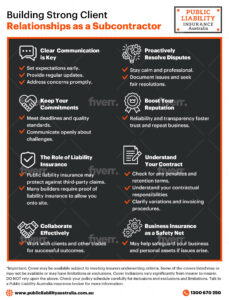 For subcontractors, cultivating strong relationships with clients, including builders and project managers, is key to securing repeat business and maintaining a solid reputation in the construction industry. While technical expertise and quality work are critical, trust and transparency often set successful subcontractors apart. Here, we discuss strategies for building trust and explore how public liability insurance may provide an additional layer of security for subcontractors.
For subcontractors, cultivating strong relationships with clients, including builders and project managers, is key to securing repeat business and maintaining a solid reputation in the construction industry. While technical expertise and quality work are critical, trust and transparency often set successful subcontractors apart. Here, we discuss strategies for building trust and explore how public liability insurance may provide an additional layer of security for subcontractors.
-
Communicate Clearly and Consistently*
Effective communication is the foundation of a strong client relationship. Subcontractors should:
- Set Expectations Early: Obtain a clear understanding of the scope of work, timelines, and expectations at the start of any project. Talk about and agree on any potential roadblocks and on any variations that may affect the price you have quotes.
- Provide Regular Updates: Keep clients, including builders and project managers, informed about progress, potential delays, or changes.
- Be Accessible: Promptly address questions or concerns to demonstrate reliability. If an issue arises get on site to address it fast.
Strong communication helps prevent misunderstandings and fosters confidence in your ability to deliver.
-
Read and Understand the Contract you are entering into *
If you are asked by a client, including builders and project managers, to sign a contract ensure you read it and understand it. Are there any penalties for delays? Is the wording clear? Can you be held responsible if other sub contractors negatively impact on your ability to deliver? Will any of your fees be held in retention and what do you need to do to receive all monies invoiced? If there are variations, is it clear how you will invoice and be remunerated?
-
Deliver on Commitments*
Following through on promises is one of the most effective ways to build trust. Meeting deadlines, maintaining quality standards, and sticking to agreed terms demonstrate your reliability and professionalism. In the event of unforeseen challenges, communicate openly and propose actionable solutions to maintain credibility. Work together with your clients and other trades to achieve a decent outcome for all parties.
-
Address Disputes Proactively*
Disputes can arise even in well-managed projects. How you handle them often impacts your reputation more than the issue itself. Key practices include:
- Remaining Calm and Professional: Approach disputes with a problem-solving mindset.
- Documenting Issues: Keep a record of any disagreements, including timelines and actions taken.
- Seeking Resolution: Aim for a fair and timely resolution, ideally through open dialogue.
-
Importance of Insurance in Protecting Relationships*
Public liability insurance and professional indemnity insurance may play a vital role in safeguarding subcontractor relationships. These policies can provide financial protection and peace of mind to all parties in the event of disputes or incidents.
- Public Liability Insurance: Covers claims of third-party injury or property damage that occur during your work. For example, if a member of the public is injured on-site due to your work, this insurance may help cover damages.
Another key reason subcontractors need public liability is that most builders and project managers require proof of public liability insurance before allowing subcontractors to commence work on-site.
This type of insurance gets you on site and if anything goes wrong may be essential to protect your business and personal assets.
Conclusion*
By fostering clear communication, contract transparency, and reliability, subcontractors can establish strong relationships with clients, including builders and project managers. Additionally, having appropriate subcontractor insurance coverage gets you on site and safeguards against the financial impact of potential disputes. Taking these steps may not only enhance trust but also help you build a thriving business based on long-term partnerships.
Disclaimer: The content of this blog article is intended for general informational purposes only and should not be considered as professional advice. For guidance regarding what and how much public liability insurance cover you need, we recommend consulting with a business insurance broker. Any actions you take based on any information provided here are at your own discretion.





